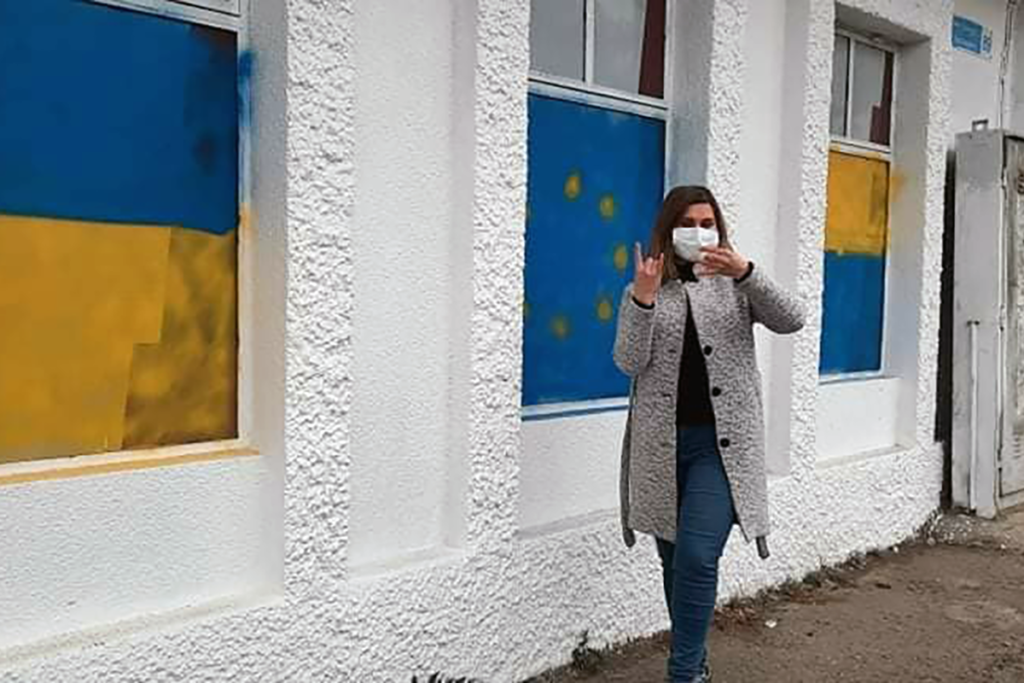Marneuli-based human rights activist Samira Bayramova is fighting against the far-right pro-Russia Georgian group Alt-Info and its political offshoot, the Conservative Movement.
Though Samira Bayramova has long been an outspoken advocate for minority rights in Georgia, she was most recently thrust into the spotlight for taking her protest straight to the Conservative Movement’s Marneuli headquarters on 14 March.
The ethnic Azerbaijani activist spraypainted the windows of the pro-Russian party’s office with the blue and yellow bicolour of the Ukrainian flag — an act that the Conservative Movement used as grounds to file a lawsuit against Bayramova and which Alt-Info supporters cited while hurling a torrent of threats and abuse at her on social media.
‘I painted the Ukrainian flag [on their windows] to show solidarity with Ukraine and to show [them] that Russia, which they support, is doing this horrible thing in Ukraine’, Bayramova told OC Media. ‘I also wrote that they are traitors’.
‘On the day of my protest, I received a lot of support and solidarity from all over the country, but I also received threats, although I realised from the very beginning that I might be in great danger. But I just used my freedom of expression.’
Bayramova was found guilty of damaging the facade of the building and was released with a verbal reprimand.
Before the ruling, activists associated with Alt-Info also gave Bayramova an ultimatum: compensate them with ₾1,200 ($400) for damages, or they would retaliate against the United National Movement (UNM). The UNM is Georgia’s largest opposition party, with whom Bayramova is not affiliated with.
Members of Alt-Info made good on their threats two days later by spray painting the opposition group’s headquarters with red and branding it with the activist’s name alongside crudely drawn penises.


The activist then filed lawsuits against ‘around 10 people’ who had threatened her and her relatives with reprisals and violence. The Prosecutor’s Office granted her victim status and placed her in a special protection programme on 22 March.
The alleged perpetrators of the abuse have yet to be charged.
‘Twice they tried to hit me with a car’
Bayramova traces the tensions with Georgia’s radical groups back to January 2020, when she took the Marneuli Municipality to court in an attempt to end its funding of the local Orthodox Church as well as local Muslim organisations.
She argued that the funding should instead be diverted to vulnerable groups, including refugees and people with disabilities.
‘The bishop of the Diocese of Marneuli and Hujabi did not like my initiative. He said that I was fighting against the Georgian Church and religion’, Bayramova recalled. ‘These groups were angry with me.’
‘I am an unacceptable person to them because I demand equality, but they think that if I am an ethnic Azerbaijani, I cannot be equal to a Georgian.’
The lawsuit is still ongoing. Bayramova says that since it kicked off, she has been followed, verbally abused, and even physically attacked.
‘They were watching me and tailing me in their cars. After the pandemic started, when I got back to work, they tried to hit me twice with a car.’
‘I realised how unfair life and society are’
Bayramova found an outlet in activism at a young age as an outspoken critic of early marriage — a battle she personally had to endure. At 15, she was nearly forced into a marriage with an older man. Only through vigorous protest and sheer will did she manage to avoid it.
‘Even though there were a lot of people against me then, I still did my best to save myself’, Bayramova recalled. ‘Then I realised how unfair life and society are’.
[Read on OC Media: Georgia's early marriages: destinies blackened in white dresses]
By avoiding marriage, she ensured that she could pursue a higher education and qualify as a lawyer, driven to defend those who, like her, could barely defend themselves.
‘The reason why I've been working on these issues for almost 13 years is that, unfortunately, the rights of women and children are still not properly protected in our country.’
Bayramova’s work has taken her to many villages across Georgia’s south. She has spoken to women working the fields about their rights, and in teahouses — traditionally considered to be almost exclusively male-only spaces — she holds discussions with men, and even found eager listeners.
‘The first time I went to a teahouse, the men there were very surprised because women generally do not go inside’, she recalled. ‘At first, people weren’t very interested in their rights, but then I drew their attention to the issues.’
Ultimately, Bayramova says she is driven by one simple desire: ‘to protect the rights of any human being so that no one is oppressed and no one's rights are violated.’




 19 May 2022
19 May 2022




